- Home
- Fergus Hume
The Pagan's Cup
The Pagan's Cup Read online
Produced by eagkw, Suzanne Shell and the Online DistributedProofreading Team at https://www.pgdp.net (This file wasproduced from images generously made available by TheInternet Archive/American Libraries.)
Cover]
The Pagan's Cup
BY
Fergus Hume
AUTHOR OF
"THE MYSTERY OF A HANSOM CAB," "THE RAINBOW FEATHER," "CLAUDE DUVAL OF NINETY-FIVE," ETC.
Vignette]
NEW YORK
G. W. DILLINGHAM COMPANY
PUBLISHERS
Copyright, 1902, by
G. W. DILLINGHAM COMPANY
[All rights reserved]
_The Pagan's Cup_
CONTENTS
CHAP. PAGE I. A Modern Arcadia 1 II. The Crusaders' Chapel 14 III. The Lady of the Manor 28 IV. The Dinner-Party 42 V. Love's Young Dream 58 VI. Trouble 71 VII. A Nine Days' Wonder 87 VIII. Haverleigh's Defence 101 IX. A Bad Reputation 113 X. The Price of Silence 126 XI. The London Detective 140 XII. A Surprise 154 XIII. An Interesting Document 168 XIV. An Unexpected Meeting 183 XV. A New Complication 198 XVI. Sybil's Visitor 214 XVII. Lord Kilspindie Explains 227 XVIII. A Miracle 242 XIX. A Story of the Past 257 XX. Mrs Gabriel's Secret 276
THE PAGAN'S CUP
CHAPTER I
A MODERN ARCADIA
Certain portions of England yet remain undiscovered by Americans anduncivilised by railways. Colester village above King's-meadows, in acounty which need not be named, is one of these unknown spots. No doubtbefore long the bicycle and the motor-car will enliven its somnolentneighbourhood, but at present it is free from the summer jaunts oftourists. With this neglect the Colester folk profess themselvessatisfied. They have no wish to come into contact with the busy world.This prejudice against intrusion dates from mediaeval times, whenstrangers rarely came to the village with peaceful intentions. Even nowa chance comer is looked upon with suspicion.
Mr Richard Pratt said something of this sort to the vicar during amorning ramble, some six weeks after he had taken up his residence inThe Nun's House. With the parson and the gentry of the parish Mr Prattagreed very well, his respectability having been vouched for by MrsGabriel, the lady of the manor. But the villagers still held aloof,although the newcomer did his best to overcome their churlish doubts.They did not credit his story that he had settled in Colester to passhis remaining years in peace, and even the money he scattered so freelycould not buy their loyalty. Pratt had never met with such peoplebefore. In most countries an open purse invites an open heart; but theColester villagers were above Mammon worship. Such an experience wasrefreshing to Pratt, and introduced him to a new type of humanity.
"The first place I ever struck in which the dollar is not all-powerful,"he said, with his Yankee twang and pleasant laugh.
"We are not sufficiently educated in that respect," replied Mr Tempestin his simple way. "For my part, I am not ill pleased that myparishioners should refuse to worship the Golden Calf."
"There is no calf about me, I guess," said Pratt, grimly, "and verylittle gold. I don't say I haven't a decent income, but as to being amillionaire--no, sir."
"In the kingdom of the blind the one-eyed is king, Mr Pratt. You are amillionaire in this poor place. But I fear you find it dull."
"Why, no, vicar. I'm glad to be out of the buzz. The world's made up ofnerves and machinery nowadays. At fifty-two years of age I can't standthe racket. This Sleepy Hollow's good enough for me to stay in until Ipeg out. Guess I'll buy an allotment in that graveyard of yours."
"Hollow!" said the vicar, smiling, "and our earthly dwelling-place isset upon a hill! Mr Pratt, I suspect you have Irish blood in yourveins."
Pratt laughed, and being to a large extent devoid of humour, explainedearnestly that he had used the word figuratively. "Washington Irving,Rip Van Winkle," he explained, nodding, whereat the vicar smiled again.
The situation of Colester was striking and strange. A green-clothedpromontory extended abruptly from the high table-land intoKing's-meadow. To right and left chalky cliffs of considerable heightflared away for miles, forming a buttress to the moors above and wallsto the plains below. In pre-historic ages the ocean waves had beatenagainst these cliffs, but, gradually receding, had left dry the milesupon miles of fertile lands now called King's-meadows. An appanage ofthe Crown, they had been called so from the days of William theConqueror.
From where they stood, the vicar and his friend had a bird's-eye view ofthis desirable land, unrolled like a map under the bright June sky.League after league of corn-fields stretched away to the clear, shiningline of ocean; and amidst the ripening grain appeared red-roofedvillages, clumps of trees, the straight lines of dusty white roads andthe winding, glittering serpent of the river. And as a background tothis smiling plenty--if so Irish an expression be permitted--was theblue expanse of the Channel dotted with the white sails of merchantmen.
A small wood of ancient oaks shut off the purple-clad moor from the spurupon which Colester was built. On the verge of this, yet encircled bytrees, stood the village church--a crusading chapel, dedicated to StGabriel the Messenger. Thence the ground fell away gradually, and spreadout into a broad neck of land, down the centre of which ran a roadleading from chapel to village. On either side of this, amidst oaks andelms and sycamores, were the houses of the gentry. From where they endedthe promontory rose into two rounded hills, with a slight depressionbetween. On the one to the left the village was built, its housescramped within a tumble-down wall, dating from the days when it wasneeded as a defence. The other hill was surmounted by a well-preservedcastle, the keep of which with its flag could be seen above the oakwoods. This was inhabited by Mrs Gabriel, the sole representative of thefeudal lords of Colester. Yet she was only the childless widow of thelast baron, and had none of the fierce Gabriel blood in her veins. Theonce powerful and prolific family was extinct.
From castle and village steps led down into the depression between thetwo hills. Down this continued the chapel road, sloping gradually withmany windings to the plains below. The whole place had the look of someRhenish robber-hold. And if tradition was to be trusted, the Gabriellords had dwelt like eagles in their eyrie, swooping down at intervalsto harry and plunder, burn and slay the peaceful folk of the plains. Aturbulent and aggressive race the Gabriels. It had defied king andpriest, and parliament and people. Time alone had ever conquered it.
"A survival of the Middle Ages," said Mr Tempest, pointing out thesethings to his companion. "It was needful that the Gabriel barons shouldbuild strong defences. They were fierce and blood-thirsty, defiant oflaw and order. For many centuries they were a scourge to the inhabitantsof the plains. These often complained to the king, and several times theplace was besieged, but without result. The Gabriels kept their hold ofit. The only thing they ever lost was their title. A bill of attainderwas passed against them in the time of the second George. After thatthey became less lions than foxes."
"Just so," said Mr Pratt. "This place couldn't do much againstartillery, I guess. And even in the bow and arrow days, a strong forcecoming over the moor and down the spur--"
"That was often tried," interrupted Tempest, quickly, "but the
attemptalways failed. In the days of Henry II. Aylmer Gabriel beat back anoverwhelming force, and then erected the chapel as a thanksgiving. TheArchangel Gabriel was the patron saint of the family, and the chapel isdedicated to him."
"He couldn't keep the family from dying out, however," said Pratt, asthey moved towards the village.
"No. With the late John Gabriel the family became extinct. But I daresayMrs Gabriel will arrange that her adopted son succeeds. He can take thename and the coat of arms. I should be very pleased to see that," addedthe vicar, half to himself. "Leo is a good fellow, and would make anexcellent landlord."
The eyes of the American flashed when the name was mentioned, but hemade only a careless comment. "Leo Haverleigh," he said, after a pause,"he's a right smart young chap, sure. Who is he?"
"The son of Mrs Gabriel's brother. She was a Miss Haverleigh, you know.I believe her brother was somewhat dissipated, and died abroad. The boyarrived here when he was three years of age, and Mrs Gabriel adoptedhim. He will be her heir."
"Is there anyone to object?" asked Pratt, eagerly.
The vicar shook his head. "The Gabriels are absolutely extinct. FailingLeo, the estates would lapse to the Crown. In the old days they wouldhave been seized by the king in any case, as the sovereigns were alwaysanxious to hold this point of vantage which dominated their lands below.But we live in such law-abiding times, that Mrs Gabriel, although not ofthe blood of the family, can leave the estates to whomsoever she will. Iunderstand that she has quite decided Leo shall inherit and take thename; also the coat of arms."
"She doesn't strike me as over-fond of the boy," said Pratt, as theyclimbed the crooked street; "rather a hard woman I should say."
"Mrs Gabriel has a particularly high moral standard," replied the vicar,evasively, "and she wishes all to attain to it. Leo--" he hesitated.
"He's no worse than a boy ought to be," said the American, cheerily."Your young saint makes an old sinner. That's so, vicar!"
Mr Tempest laughed outright. "I fear there is small chance of Leobecoming a saint either young or old," he said, "though he is a goodlad in many ways. Wild, I admit, but his heart is in the right place."
Pratt smiled to himself. He knew that Leo was in love with Sybil, thedaughter of this prosy old archaeologist. Simple as Mr Tempest was, hecould not be blind to the possibility of his daughter making such anexcellent match. "Oh, yes," laughed Pratt, knowingly, "I'm sure hisheart is in the right place."
But by this time the vicar was on his hobby horse, and did not gauge thesignificance of the speech. "Here," he said, waving his hand towards thefour sides of the square in which they stood, "the Romans built a camp.It crowned this hill, and was garrisoned by the tenth legion to overawethe turbulent tribes swarming on the plains below. In fact, this town isbuilt within the camp, as the name shows."
"How does it show that?" asked Pratt, more to keep the vicar talkingthan because he cared.
"The name, man, the name. It is properly Colncester, but by usage hasbeen shortened to Colester. Coln comes from the Latin _colonia_, acolony, and caster, or cester, is derived from _castra_, a camp.Colncester therefore means the camp colony, which proves that theoriginal builders of this town erected their dwellings within thecircumvallation of the original _castra_ of Claudian. If you will comewith me, Mr Pratt, I will show you the remains of this great work."
"I have seen it several times before," replied Pratt, rather bored bythis archaeological disquisition. "I know every inch of this place. Itdoesn't take an American centuries to get round, and six weeks ofwalking have fixed me up in your local geography. But there's thechapel, vicar. We might walk up there. I'd like to hear a few remarks onthe subject of the chapel. Interesting. Oh, I guess so!"
"Certainly! certainly!" said Tempest, absently, "let us walk, walk," andhe strolled away with his hands in his tail-coat pockets, lookingsomething like an elderly jackdaw. Indeed the churchman, with his lean,oval face, his large spectacles and the fluttering black garments on histhin figure, very much resembled a bird. He was scholarly, well-bred andgentle, but wholly unworldly. Since his wife had died seven yearsbefore, Sybil had taken charge of the house. Harold Raston, theenergetic curate, looked after the parish. But for these two, bothclerical and domestic affairs would have been neglected, so immersed wasMr Tempest in his dry-as-dust explorations. Many people said openly thatthe vicar was past his work and should be pensioned off. Mrs Gabriel, acapable and managing woman, had once hinted as much to him. But theusually placid parson had flown into such a rage, that she had hastilywithdrawn herself and her suggestion. "There is nothing more terriblethan the rebellion of a sheep." Mrs Gabriel recalled this remark ofBalzac's when Tempest, proving himself worthy of his name, swept her inwrath from his study.
Pratt was quite another specimen of humanity. A neat, dapper, suavelittle man, undersized yet perfectly proportioned. He had black hair,black eyes, and a clean-shaven face, which constantly wore anexpression of imperturbable good-humour. His dress was too neat for thecountry. A blue serge suit, white spats on brown boots, a Panama hat,gloves and--what he was never without--a smoothly-rolled umbrella.Spick-and-span, he might have stepped out of a glass case, and this washis invariable appearance. No one ever saw Pratt unshaven or untidy. Hehad been everywhere, had seen everything, and was a most engagingcompanion, never out of temper and never bored. But for all his smilingways the villagers held aloof from him. Wishing to break down theirbarrier of prejudice, the sharp little American had attached himself tothe vicar during the good man's usual morning walk. He thought that sucha sight might dispose the villagers to relent.
"I shall not vary my usual walk," remarked Mr Tempest, positively. "Wewill stroll through the village, return to the chapel, and then, MrPratt, I hope you will lunch with me."
"Delighted, if it will not put Miss Sybil out."
"No, no. My wife is always prepared for chance visitors," answered thevicar, quite oblivious to the fact that the late Mrs Tempest was restingin the churchyard. "Ha, this is Mrs Jeal. How do you do, Mrs Jeal?"
Mrs Jeal was in excellent health, and said so with a curtsey. A dumpy,rosy-faced woman was Mrs Jeal, with a pair of extremely wicked blackeyes which snapped fire when she was angered. She had a temper, butrarely displayed it, for it suited her better to gain her ends by craftrather than force. Fifteen years ago she had appeared from nowhere, tosettle as a midwife in Colester. Contrary to their usual fashion, thevillagers had taken her to their bosoms. This was owing to the cleverway Mrs Jeal had of managing them, and to her knowledge of herbs. Shehad cured many sick people whom the doctor had given up, andconsequently was not looked upon with favour by Dr James, who hadsucceeded to the family practice. But even he could not be angry atrosy, laughing Mrs Jeal. "Though I don't like her," confessed Dr James;"the devil looks out of her eyes. Dangerous woman, very dangerous."
Pratt had no chance of proving this remark of the doctor's to be true,for Mrs Jeal never looked at him. She kept her wicked eyes on the kindlyvicar and smiled constantly, punctuating such smiles with an occasionalcurtsey. "Pearl is not with you?" said Mr Tempest.
"No, bless her poor heart!" cried Mrs Jeal, "she is up at the chapel.Her favourite place is the chapel, as your reverence knows."
"She might have a worse place to haunt, Mrs Jeal. Poor soul--poor, mad,innocent child!"
"Do you call eighteen years of age childish, Mr Tempest?" asked thewoman.
"No, no! I speak of her mind, her poor, weak mind. She is still a child.I beg of you to look after her, Mrs Jeal. We must make her path aspleasant as we may."
"Then I beg your reverence will tell that Barker to leave her alone."
"Barker, Barker? Ah, yes, the sexton--of course. Worthy man."
Mrs Jeal sniffed. "He won't let her stay in the chapel," she said.
"Tut! tut! This must be seen to. Poor Pearl is God's child, Mrs Jeal, soshe has a right to rest in His House. Yes, yes, I'll see to it.Good-day, Mrs Jeal."
The woman dropped a curtsey, and for the first time s
hot a glance atPratt, who was smiling blandly. A nervous expression crossed her face asshe caught his eye. The next moment she drew herself up and passed on,crossing herself. Pratt looked after her, still smiling, then hurried torejoin the vicar, who began to explain in his usual wandering way.
"A good woman, Mrs Jeal, a good woman," he said. "For some years she hashad charge of Pearl Darry, whom she rescued from her cruel father."
"Is that the insane girl?" said Pratt, idly.
"Do not talk of one so afflicted in that way, Mr Pratt. Pearl may not bequite right in her head, but she is sane enough to conduct herselfproperly. If the fact that she is not all herself reachedPortfront"--the principal town of the county--"it is possible that theauthorities might wish to shut her up, and that would be the death ofPearl. No, no!" said the good vicar, "let her have a fair share of God'sbeautiful earth, and live to a happy old age. In this quiet place we canafford one natural."
"Like the village idiot we read about in Scotch tales," said Pratt.
"Just so, Mr Pratt. In _Waverley_ there is such a one. Pearl Darry isquite harmless, and really has a very beautiful nature. Mrs Jeal is muchto be commended for her charity."
"She looks a charitable woman," said the American, but whether he meantthis ironically or not it is hard to say.
The women of Colester were mostly lace-workers, and toiled at thisfairylike craft while their husbands worked in the fields below. Duringthree seasons the mountain men, as they might be called, ploughed themeadow-land, sowed the corn and helped to reap and harvest it. In thewinter they returned to live on their earnings and take a holiday. Butthe women worked all the year through, and Colester lace was famous. Asthe vicar and Pratt walked down the street, at the door of every housesat a woman with her pillow and pins dexterously making the filmy fabricwhich was destined to adorn the dress of many a London beauty. They weremostly serious-looking, and some even grim. But all had a smile for thevicar, although they pursed up their lips when they saw the good-naturedface of Pratt. Most unaccountable this dislike they had for theAmerican. He was rather annoyed by his pronounced unpopularity.
"I must really do something to make them like me," he said, much vexed.
"Tut, tut!" replied the vicar, "liking will come in good time, Mr Pratt.It takes some years for them to fancy a stranger. I was an object ofdistrust to them for quite three. Now they are devoted to me."
"And have you been here long?"
"About forty years," said Tempest. "I have buried many and christenedmost. We have no Methodists in Colester, Mr Pratt. Everyone comes tochurch and worships according to the rites of the Anglican communion, asis fit and proper."
"I suppose you are a prosperous community on the whole?"
"So, so! Nothing to complain of. The lace made here by those cleverfingers sells well in London and even abroad. Then the men earn a fairwage in King's-meadows. Mrs Gabriel looks after the few poor we haveamongst us. On the whole, we have much to be thankful for, Mr Pratt."
Thus talking the good vicar led his companion round by the moulderingwalls, where they could look down on to the plains. After a glance theyre-entered the town and walked through the cobbled-stoned streets,between the quaint, high-roofed houses. Everywhere the vicar was greetedand Pratt frowned upon. He was quite glad when they descended from thevillage through the old gate, and after walking along the neck, whichwas the fashionable part of Colester, began to climb up towards thechapel.
"A most delightful spot," said Pratt, politely; "but I guess the folkdon't cotton to me. I must make them freeze on somehow."

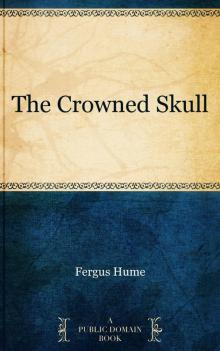 The Crowned Skull
The Crowned Skull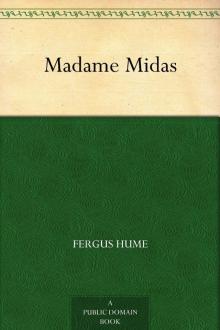 Madame Midas
Madame Midas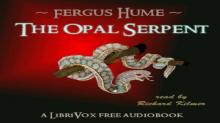 The Opal Serpent
The Opal Serpent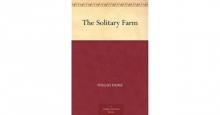 The Solitary Farm
The Solitary Farm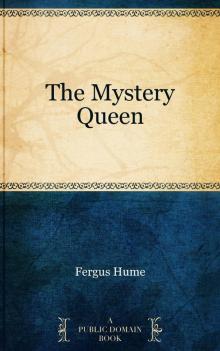 The Mystery Queen
The Mystery Queen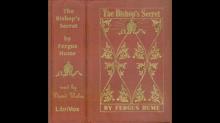 The Bishop's Secret
The Bishop's Secret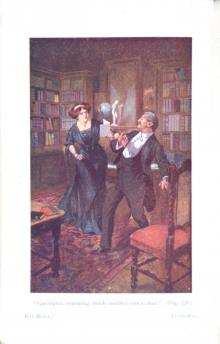 Red Money
Red Money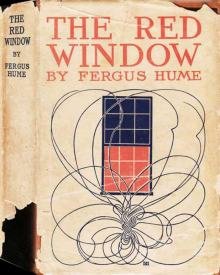 The Red Window
The Red Window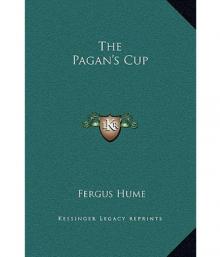 The Pagan's Cup
The Pagan's Cup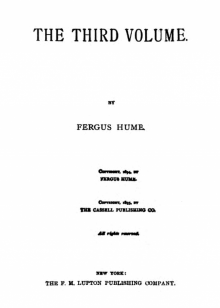 The Third Volume
The Third Volume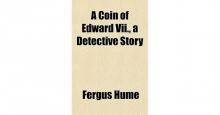 A Coin of Edward VII: A Detective Story
A Coin of Edward VII: A Detective Story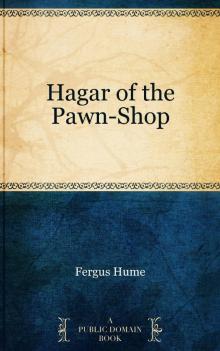 Hagar of the Pawn-Shop
Hagar of the Pawn-Shop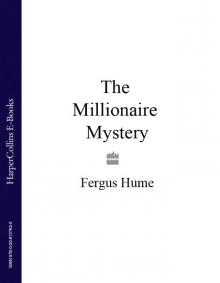 The Millionaire Mystery
The Millionaire Mystery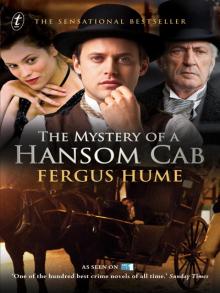 The Mystery of a Hansom Cab
The Mystery of a Hansom Cab